
Serge Gainsbourg was a French singer, songwriter, pianist, film composer, poet, painter, screenwriter, writer, actor and director. Regarded as one of the most important figures in French popular music, he was renowned for his often provocative and scandalous releases, as well as his diverse artistic output, which embodied genres ranging from jazz, mambo, world, chanson, pop and yé-yé, to rock and roll, progressive rock, reggae, electronic, disco, new wave and funk. Gainsbourg's varied musical style and individuality make him difficult to categorize although his legacy has been firmly established and he is often regarded as one of the world's most influential popular musicians.

Jacques Dutronc is a French singer, songwriter, guitarist, composer, and actor. He has been married to singer Françoise Hardy since 30 March 1981 and the two have a son. He also has been a longtime songwriting collaborator with Jacques Lanzmann. Some of Dutronc best known hits include "Il est cinq heures, Paris s'éveille", "Le Responsable", and "Les Cactus".
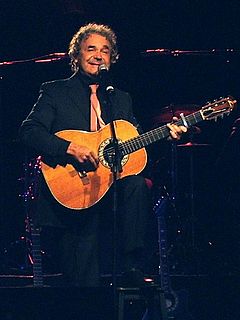
Pierre Perret is a French singer and composer. Pierre Perret resides in the city of Nangis.
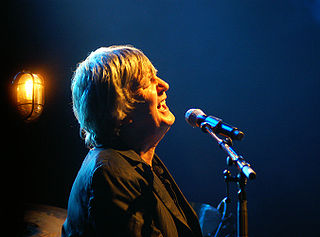
Jacques Joseph Victor Higelin was a French pop singer who rose to prominence in the early 1970s. Early in his career, many of Higelin's songs were effectively blacklisted from French radio because of his controversial left-wing political beliefs and his association with left-wing advocacy groups.

Pierre Lapointe is a Canadian singer-songwriter. His work largely follows in the tradition of French chanson, though he is influenced by modern pop music. Defining himself as a "popular singer", he has built an egocentric persona of a dandy onstage, but says he does this mostly to deflect attention from himself. His records have found critical and commercial success in Canada.
French popular music is a music of France belonging to any of a number of musical styles that are accessible to the general public and mostly distributed commercially. It stands in contrast to French classical music, which historically was the music of elites or the upper strata of society, and traditional French folk music which was shared non-commercially. It is sometimes abbreviated to French pop music, although French pop music is more often used for a narrower branch of popular music.
The Grand Prix du Disque for French Song is one of a number of prizes awarded by L'Académie Charles Cros as part of the yearly Grand Prix du Disque. The following is a partial list of winners :
Nouvelle Chanson, derived from the French expression nouvelle scène française, sometimes anglicized as New Chanson, is a musical genre of Chanson which emerged in France in the 1990s and developed in the 2000s. This genre takes inspiration from such forefathers of French Chanson as Jacques Brel, Georges Brassens or Barbara, albeit in a more soft-pop music style. However, the principal influences appear to be rockier artists such as Serge Gainsbourg or Brigitte Fontaine. Principal French exponents of Nouvelle Chanson include artists such as Benjamin Biolay, Émilie Simon, Coralie Clément, Keren Ann, Françoiz Breut, Olivia Ruiz, and Camille. The term Chanson Nouveau is also used, and as a developing genre, there is considerable disagreement even in France about who belongs in this genre and how it is to be described.
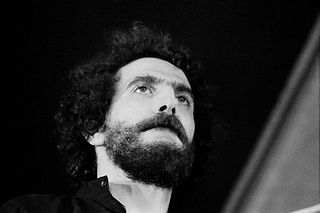
Areski Belkacem, also known simply as Areski, is a French singer, multi-instrumentalist, comedian and composer.
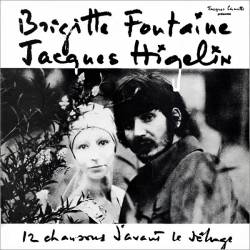
12 chansons d'avant le déluge is the second album by experimental French singer Brigitte Fontaine, and the first by French rock singer Jacques Higelin, released in 1966 on the Productions Jacques Canetti label. It was their only real release on the label, they would go on to release a few more singles that would be collected on the 15 chansons d'avant le déluge, suite et fin album in 1976, before moving to the Saravah label.
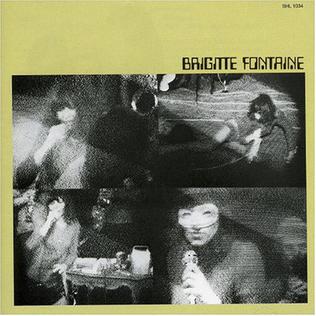
Brigitte Fontaine is the fifth album by experimental French singer Brigitte Fontaine, released in 1972 on the Saravah label.
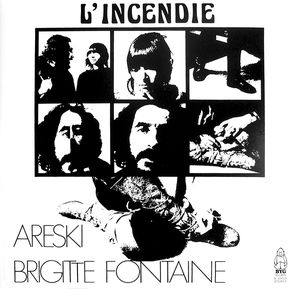
L'Incendie is the seventh album by experimental French singer Brigitte Fontaine and the fifth by Areski Belkacem, released in 1974 on the Byg Records label. It is their third collaborative album.

15 chansons d'avant le déluge, suite et fin is a compilation by experimental French singer Brigitte Fontaine and French rock singer Jacques Higelin, released in 1976 on the Productions Jacques Canetti label.

Genre humain is the twelfth album by experimental French singer Brigitte Fontaine, released in 1995 on the Virgin Records label. The album features a new version of Comme à la radio, the title track from her 1970 album. The song Il se mêle à tout ça is inspired by an autobiographic event of her life.

Les Palaces is the thirteenth album by experimental French singer Brigitte Fontaine, released in 1997 on the Virgin Records label. The album was nominated at the Victoires de la musique for Artist of the Year, but lost to Zazie. The album features a collaboration with Alain Bashung, City, although Fontaine herself admits that the song is "a bit of a failure".
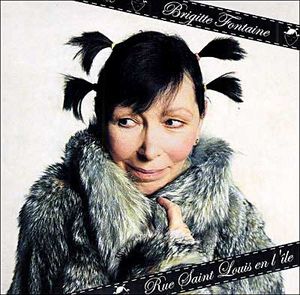
Rue Saint Louis en l'Île is the fifteenth album by experimental French singer Brigitte Fontaine, released in 2004 on the Virgin Records label. It features a new version of Le Nougat from her French corazon album with Mustapha and Hakim Amokrane of French band Zebda, as well as a duet with Areski Belkacem, Le Voile à l'école. There's also a cover of Édith Piaf, L'Homme à la moto, which was present before on an hommage album to the singer, in the words of Fontaine, "just to show off".

Libido is the sixteenth album by experimental French singer Brigitte Fontaine, released in 2006 on the Polydor label. It once again features a collaboration with -M- on the song Mister Mystère, which -M- also sang solo on his fourth album, to which it gave its title. Brigitte Fontaine, for the first time in more than thirty years, calls upon arranger Jean-Claude Vannier for some songs, Barbe à papa and Mendelssohn. The title of Château intérieur comes from a book by Teresa of Ávila, although Fontaine admitted she didn't read it.

Prohibition is the seventeenth album by experimental French singer Brigitte Fontaine, released in 2009 on the Polydor label. The album features political content, as it is described by Fontaine as "a rebellious album", and the song Partir ou rester was written as a reaction to the 2007 French presidential election.
















